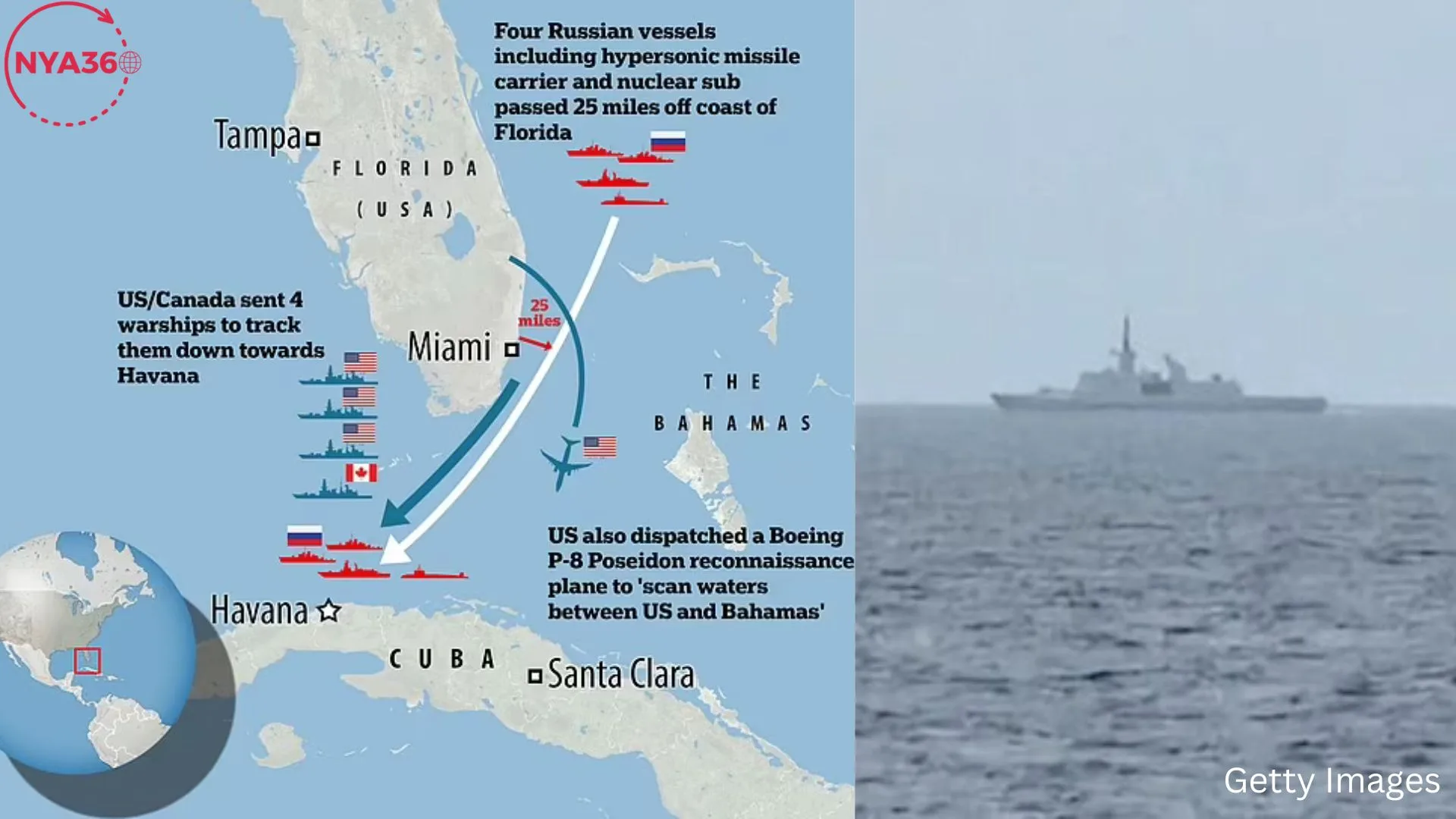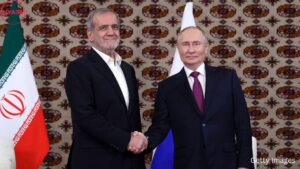The United States has sent a firm demand to Russia, urging them to promptly remove their warships from the waters off the coast of Florida, marking a significant increase in international tensions. This assertive command is a direct response to a group of Russian navy ships, which includes a nuclear submarine, aligning itself dangerously near the United States mainland. The current scenario has prompted a rapid and intense series of diplomatic and military actions, leading to concerns about the possibility of conflict and wider geopolitical consequences.
The confrontation commenced when a Russian naval flotilla, headed by the state-of-the-art missile frigate Admiral Gorshkov and the nuclear submarine Kazan, was identified about 25 miles away from the shoreline of South Florida. This extraordinary proximity to the territorial seas of the United States has been seen as a deliberate act of provocation. According to reports, the Russian fleet is currently heading towards Cuba, which adds to the already tense situation due to the historical and geopolitical importance of this location.
The U.S. Navy promptly sent its ships and aircraft to surveil and monitor the Russian flotilla in response to its arrival. Rear Admiral John Smith, the commander of the U.S. Navy forces in the Atlantic, underscored the gravity of the situation by affirming, “We are implementing all requisite actions to guarantee the safety and protection of our territorial waters and our citizens.” The proximity of these Russian vessels is a matter of great worry.
The Russian Ministry of Defense has justified the deployment by asserting that the ships are engaged in regular exercises. As per Kremlin sources, these exercises aim to assess the effectiveness of advanced weaponry and to “retaliate against the U.S. similarly.” This statement refers to NATO’s military operations near Russian borders, which Moscow has consistently condemned as hostile and provocative. Russian President Vladimir Putin, renowned for his strong approach to international relations, emphasized this message with a direct comment: “Doesn’t feel pleasant, does it?” This rhetorical remark exemplifies the Kremlin’s narrative that Russia is simply retaliating similarly to perceived Western intrusions and provocations.

The Russian defense ministry provided further details about the nature of the training, explaining that Admiral Gorshkov effectively protected Northern Fleet vessels from simulated aerial assaults and anti-ship missile strikes. The addition of the Kazan, an advanced nuclear submarine equipped with guided missile weaponry, introduces a substantial and concerning aspect to the exercises.
The response from the United States has been prompt and unambiguous. The State Department has lodged an official complaint, insisting on the prompt removal of Russian vessels from the vicinity of U.S. waterways. Secretary of State Antony Blinken described the Russian maneuvers as “unjustified and perilous,” cautioning that any misjudgment may result in significant repercussions. President Joe Biden, in his address to the country, underscored the unwavering dedication of the United States to safeguarding its territorial sovereignty. “We shall not be deterred by these irresponsible actions,” Biden proclaimed. “Our maritime forces are completely ready to safeguard our nation and our partners.”
The tragedy has elicited responses from the global community. Jens Stoltenberg, the Secretary-General of NATO, urged for composure and self-control, emphasizing the significance of preventing unwarranted escalations. “This is a situation of great sensitivity that necessitates cautious management to avoid any inadvertent conflicts,” Stoltenberg stated. China, a key partner of Russia, has openly endorsed Moscow’s prerogative to carry out maritime operations in global waters while calling on all other countries to seek a diplomatic resolution to the matter. The proximity of Russian warships to the U.S. mainland serves as a clear reminder of the tensions during the Cold War, which often led to naval confrontations between the two countries. However, this event takes place in a modern atmosphere characterized by revived competition among major powers and changing geopolitical dynamics.
The strategic ramifications have great importance. The Russian deployment poses a threat to U.S. naval supremacy in the Western Hemisphere and demonstrates Moscow’s readiness to establish its military footprint in regions beyond its usual areas of control. Analysts suggest that this action is a component of a more comprehensive plan to counteract NATO operations near Russian borders and to reaffirm Russia’s worldwide military might.
🇷🇺🇨🇺RUSSIA NUCLEAR SHIPS REACH PORT OF HAVANA
After coming within a mere 25 miles of Florida, the Russian frigate "Admiral Gorshkov" entered the port of Havana, Cuba.
The U.S "welcomed" the Russian ships with several Naval Destroyers that tailed them on their way to port.
The… https://t.co/ts5NQtlzQA pic.twitter.com/ol3cZWIrWy
— Mario Nawfal (@MarioNawfal) June 12, 2024
Amidst the tense confrontation between the naval forces of the United States and Russia on the coast of Florida, the global community anxiously observes the situation. The situation is currently dynamic, with diplomatic channels exerting extra effort to reduce the intensity of the dispute. The possibility of making a mistake or unintentionally causing conflict is significant, highlighting the importance of responding in a controlled manner and using deliberate diplomacy.
The proximity of Russian warships to U.S. seas serves as a clear indication of the ongoing instability in global relations and the constant possibility of military conflicts in a world that is becoming more multipolar. The upcoming days will play a critical role in deciding whether this event will be amicably resolved or expand into a more extensive crisis, carrying serious consequences for global stability and security.
Follow us on social media: Instagram, Threads & Twitter X @nya360_ YouTube & Facebook @nya360.





